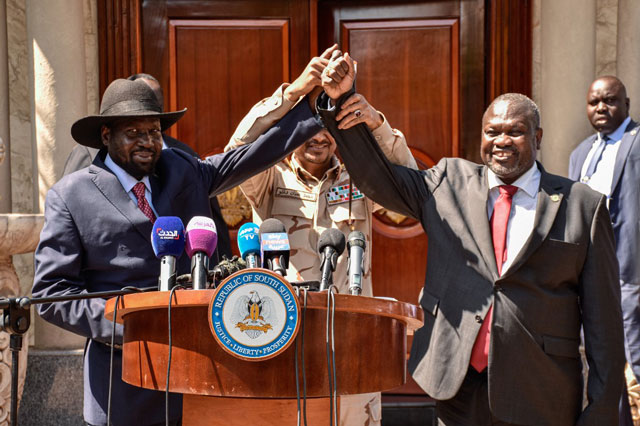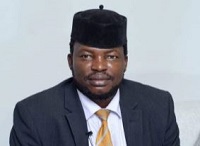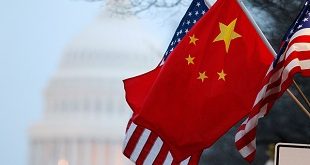
Majak Kuany / AFP
The initiative by the High-level Mediation on South Sudan is an African solution to an African problem
COMMENT | DAK BUOTH RIEK GAAK | The famous phrase known as “African solutions to African problems” is an intellectual and political concept whose origin can be traced back to the 1990s at the height of the civil war in Somalia. It was first coined by the learned Pan-Africanist and eminent economist, George Ayyitey, as part of his response to the raging and devastating conflict in the aforementioned East African country. By then, the argument was that the external interventions from outside Africa had proven insignificant and ineffective. Thus, long-term solutions to African problems must originate and come from the Africans on the continent.
In other words, African solutions to African problems mean that Africans should always devise a workable solution to their perennial problems. Nonetheless, this concept should not be misconstrued to mean that Africa is excluding the world because that would be a mistake considering that Africa is not an island. However, this Pan-African idea is part and parcel of an effort to make Africans take charge and own their destiny with assistance from the outside world.
The African solution to African problems is an idea whose time has come. This political concept was drawn from the fact that Africa had been occupied by foreign powers for several decades. Today, if the continents were to compete and be rated based on occupation and colonization, Africa would be the number one. Despite Africa being the most occupied and colonized continent, it is still lagging in all aspects of development. Therefore, it is on this historical fact that Africans are compelled to search and find home-grown solutions to their recurrent problems.
This brings me to the point that the High-level Mediation for South Sudan commonly known as the Tumaini (Hope) Initiative is a perfect example of an African solution to an African problem. The Tumaini Initiative is an extension and or continuation of the Rome Peace Talks mediated by Community Sant’Egidio under the leadership of Pope Francis.
In 2019, the talks between the Government of South Sudan and hold-out opposition groups started in earnest. Unfortunately, the peace talks dragged on until it became a drag. The Rome Peace Talks were characterized by postponements and withdrawals by the parties to the mediation, leading to its subsequent referral and transfer to Nairobi. In December 2023, President Salva Kiir in his wisdom asked his Kenyan counterpart President Dr. William Samoei Ruto to take over the peace mediation that has been dragging on for about six years. The latter felt morally and legally obliged and agreed to mediate the conflict without hesitation. Soon after, he appointed General Lazarus Sumbeiywo as chief mediator, deputized by Ambassador Mohammed Ali Guyo.
Before the launch of the Tumaini Initiative, President Ruto, who doubles as host and Chairperson of Tumaini Initiative, instructed his mediators to invite opposition parties and other bodies like Intergovernmental Authority on Development (IGAD) and Community Sant’Egidio to join as his co-mediation teams. The decision to invite and involve IGAD was very important due to their previous and latest roles in the ongoing negotiations. Remember it is the same body that mediated the defunct Revitalized Agreement on the Resolution of the Conflict in South Sudan (R-ARCISS), which the hold-out groups refused to sign on 12 September 2018. I believe in the six months of the Tumaini initiative, IGAD has learned and corrected her mistakes in the previous mediation.
More often than not, IGAD is to blame not just because they hurriedly brokered a disputed agreement but also for proposing and selling to parties the idea of five vice presidents in South Sudan. Even if we attributed the primary failure of R-ARCISS to the parties, IGAD has its share of blame for not paying attention to the views of the hold-out groups at the times. Although they carried the blame in the previous peace negotiation, IGAD’s participation in the Tumaini Initiative is crucial. I fear if IGAD had not been invited to participate in the Tumaini Initiative, they could have teamed up with groups such as the National Security Service (NSS), National Transitional Committee (NTC), and Revitalized Joint Monitoring and Evaluation Commission (R-JMEC), which are analyzed and alleged to be anti-Tumaini Initiative for one reason or another. The clandestine objection to the Tumaini Initiative by the above-mentioned institutions demonstrates the level of state capture and state privatization in South Sudan.
The fundamental question is: If the heads of the above institutions are true public servants with patriotic hearts of integrity and humanity, how can they work to oppose and sabotage the peace effort proposed and championed by the president whom they purport to support in his developmental agenda? Further, it would be remembered that the Tumaini Initiative was the idea of President Kiir, who persuaded and prevailed on the Kenyan president to take over from Community Sant’Egidio. Unfortunately, some of the well-known Kiir allies who are reported to be opposed to the Tumaini Initiative under the pretext of disliking the return of the opposition luminaries like Generals Stephen Buoy Rolnyang, Oyai Deng, Pagan Amum, Malong, and Mario Jada are opposing the president’s peace project wittingly or unwittingly. Perhaps the aforesaid anti-Tumaini Initiative elements are clueless on the whole idea of the Initiative whose cardinal objective is to rescue and restore our people’s hopes for a permanent constitution. In the Bible, Luke 23:34, Jesus said, ‘‘Father forgives them, for they do not know what they are doing.’’
Moreover, the involvement and inclusion of the Community Sant’Egidio as co-mediator was a just decision. Since 2019 when the first peace talks began in Rome, Community Sant’Egidio made a lot of sacrifices, including but not limited to inviting President Kiir and his accompanying vice Presidents to have their feet kissed by Pope Francis in Rome, Italy. Again, how Tumaini Initiative started at high speed due to the previous works and efforts by Community Sant’Egidio without which the mediators could have delayed and started the process from scratch.
Interestingly, the involvement and inclusion of Community Sant’Egidio does not change the status of the Tumaini initiative from being an African Solution to an African problem. It only gives the Tumaini Initiative a new status as a global political agreement.
Secondly, the decision by mediators to put and accommodate all delegates in one single hotel and apartment where they sleep, dine and wine together played a positive role in the mediation process. At times when we sit together and talk, we see ourselves more as friends and not foes. This is why you see the government delegation is said to be fighting hard against people opposed to the Tumaini initiative in Juba.
Finally, on 10 October 2024, Chief Mediator General Lazarus Sumbeiywo whispered to veteran journalist Fred Olouch of the East African newspaper that the Tumaini Initiative Agreement will be signed come next month, November 2024. This news report went viral like wildfire on social media. Truth be told, it cannot be doubted and disputed because it comes from the horse’s mouth. It is good news to the South Sudanese general public who are yearning for peace.
In conclusion, as a delegate to the Tumaini Initiative, I felt obliged to convey the news to the public to prepare and be ready for the signing ceremony whose Day and time are yet to be announced by the Chief Mediator in consultation with parties and delegates to the High-Level Mediation for South Sudan, alias Tumaini Initiative.
*****

Dak Buoth Riek Gaak is the National Chairperson of Legal and Constitutional Affairs of the South Sudan People’s Movement/Army (SSPM/A) and is a delegate to the Tumaini Initiative.
Source: Internet
 The Independent Uganda: You get the Truth we Pay the Price
The Independent Uganda: You get the Truth we Pay the Price



